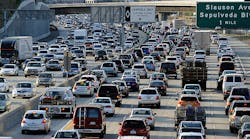Every year the American Transportation Research Institute releases a report on the 100 worst bottlenecks on U.S. highways. GPS data is used as the basis for the report.
When trucks are in congested conditions or reach a bottleneck their efficiency decreases and their fuel consumption increases. Bad news and more bad news.
Until an infrastructure bill gets passed, drivers are stuck dealing with these bottlenecks in places like Atlanta (No. 1 and No. 4) Fort Lee, NJ (No. 2), Chicago (No. 3), Los Angeles (No. 5), Boston (No. 6), Baltimore (No. 7), Queens (No. 8), Cincinnati (No. 9) and Louisville (No. 10).
In a previous blog, I talked about the cost of congestion to the trucking industry. The cost is staggering.
The good news is that today’s technology can help you with vehicle routing to avoid these bottlenecks. I preach eliminating out of route miles but I think that has to be balanced against the time your driver will lose sitting in a bottleneck. It’s not an easy task.
The good news is that route optimization software is available to help you with “what if” scenarios so that you can achieve optimal freight efficiency. Real-time traffic alerts can also help you re-route drivers around accidents or areas of heavy congestion.
Improving freight efficiency isn’t just about adding aerodynamic devices to your trucks or reducing the percent of your time in idle; it also involves looking at how your trucks get to where they need to go. All these things added together will get you the most miles for your gallon of fuel.



